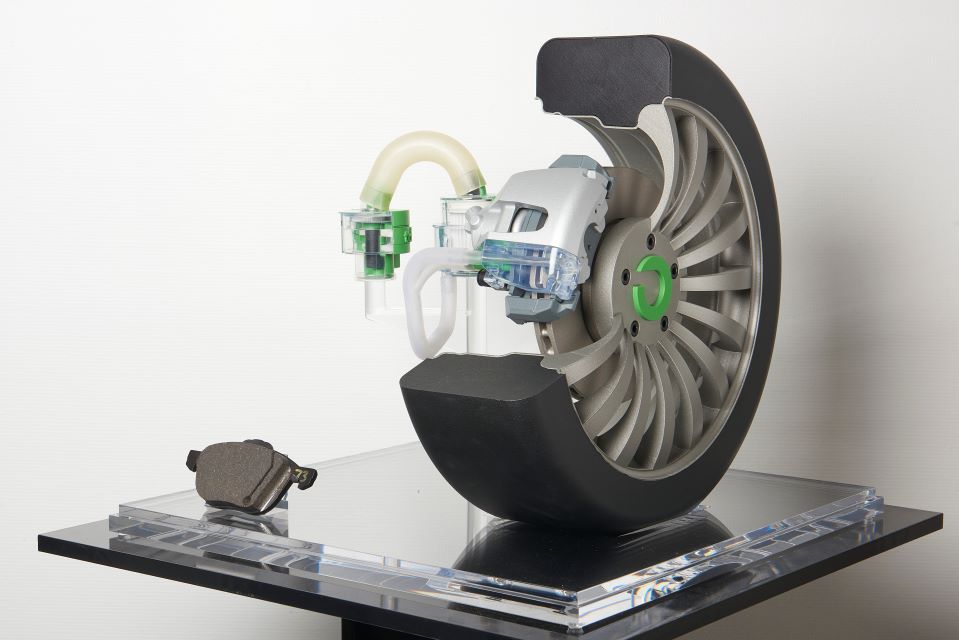Mulhouse Alsace Agglomération (m2A), Transdev, Tallano Technologies and IVECO BUS are launching a full-scale trial of a system for capturing fine particles from braking at source on urban buses. This French innovation, a world first in ecological transition, prepares the way for the entry into force of European Euro 7 regulations.
Following the announcement of the project in April 2024, the inauguration of this operational phase took place in the presence of the President of Mulhouse Alsace Agglomération, Fabian Jordan, and the Chairman and CEO of Transdev group, Thierry Mallet. This is a world first, carried out on the Soléa network, the historic mobility operator in the Mulhouse conurbation.
Press release
Download the press releaseThe first bus, now fitted with a particulate filter by Tallano Technologies, will start operating on July 1,,2025. The solution is being deployed on three buses, and will gradually be extended to 50 retrofit vehicles on the existing fleet, before being integrated into all new buses between 2025 and 2030.
Pioneering technology under real-life conditions
Developed by Tallano Technologies, TAMIC® technology captures at source over 70% of the fine particles emitted by braking. This technology is fully in line with current trends: fine particles linked to vehicle braking will be regulated by 2030, with the entry into force of European Euro 7 regulations for heavy-duty vehicles.
By 2050, non-exhaust emissions are expected to account for up to 90% of all particulates emitted by road transport, as exhaust particulates will decrease due to the electrification of vehicles, according to the impact study that accompanied the European Commission’s proposal for a European regulation.
The braking of vehicles, including heavy goods vehicles, coupled with the friction of tires on asphalt, is the main source of air pollution in cities via fine particles. ADEME has estimated that by 2022, more than half the particulates emitted by recent road vehicles will come from these sources.
A concrete response to environmental and public health challenges
Each internal combustion engine bus emits an average of 4 kg of braking particles per year, which, if not captured, are dispersed into the air and soil. According to the French Environment and Energy Management Agency (ADEME), fine particle emissions from brakes, tires and road surfaces now exceed those from exhaust.
The TAMIC® system, protected by over 50 international patents, works in two stages:
- The particles are captured by a groove created in the brake pad, and are then transported to the brake.
- Retention of over 70% of fine and ultrafine particles in a filter.
This innovation, awarded a prize by Propulse as part of the new agreement between m2A and Soléa, is fully in line with the conurbation’s climate strategy, which aims to anticipate future standards and sustainably improve air quality for its residents.
Mulhouse Alsace Agglomération, a European laboratory for mobility and a true territory of innovation, is pursuing an ambitious mobility policy, while at the same time taking care to improve air quality, a major public health issue included in our New Deal Climate Plan. We are therefore proud to be associated with this project, in conjunction with Transdev, Tallano technologies and IVECO BUS, and to be able to test it on our fleet for the urban mobility network managed by Soléa in our conurbation.
Fabian Jordan, President of Mulhouse Alsace Agglomération (m2A)
We're delighted to be making a world-first contribution to this experiment in Mulhouse, a pioneering area in terms of ecological transition. This French technology embodies our ambition: to offer clean, innovative and responsible mobility, serving local communities and their inhabitants. Every day, we work to promote shared mobility that is more respectful of the environment and air quality. This innovation is a perfect illustration.
Thierry Mallet, Chairman and CEO of the Transdev group.
After 10 years of research, this operation, carried out in partnership with Transdev and IVECO Group, with the decisive support of m2A and its Soléa network, marks the start of industrial deployment of the TAMIC® system in the world of heavy goods vehicles. This is a key step towards making the system available in pre-production to all manufacturers and operators from 2026 onwards.
Jean-Louis Juchault, Chairman and CEO of Tallano Technologies
Award-winning innovation in 2024. In 2024, the Agence de l’Innovation pour les Transports launched the 4th edition of Propulse, a program to support and accelerate innovative projects. Three calls for projects were launched: Sustainable transport; Multimodality and intermodality; Data sharing.

